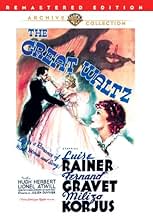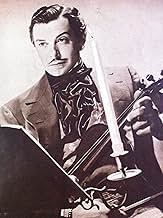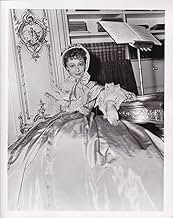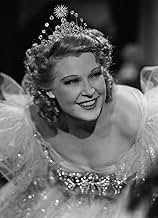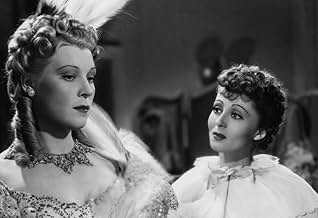CALIFICACIÓN DE IMDb
6.4/10
1.4 k
TU CALIFICACIÓN
En la Viena de 1845, Johann Strauss II prefería escribir e interpretar valses a cualquier otra cosa, en una época en la que el vals no se consideraba música de sociedad. Tras ser despedido d... Leer todoEn la Viena de 1845, Johann Strauss II prefería escribir e interpretar valses a cualquier otra cosa, en una época en la que el vals no se consideraba música de sociedad. Tras ser despedido de su trabajo decide seguir su pasión.En la Viena de 1845, Johann Strauss II prefería escribir e interpretar valses a cualquier otra cosa, en una época en la que el vals no se consideraba música de sociedad. Tras ser despedido de su trabajo decide seguir su pasión.
- Dirección
- Guionistas
- Elenco
- Ganó 1 premio Óscar
- 2 premios ganados y 3 nominaciones en total
Fernand Gravey
- Johann Strauss
- (as Fernand Gravet)
Sig Ruman
- Wertheimer
- (as Sig Rumann)
Ernie Alexander
- Revolutionary
- (sin créditos)
Opiniones destacadas
A perfect and absolute delight from beginning to end. The great music of Johann Strauss is performed in such beautiful, elaborate settings! MGM reproduced Vienna and the era perfectly. It is too bad this was the only film in which Miliza Korjus appeared. Such a magnificent voice and charming personality! The carriage ride in the Vienna Woods and that final, unbelievable, note she holds for what seems like eternity are never to be forgotten. Luise Rainer is wonderful and could always convey such emotion without ever uttering a word. Perfect casting, with so many great character actors in supporting roles.
Julien Duvivier, the great French director, had a brief career in Hollywood during WWII. Alas, the movies he was involved with, didn't fare as well as the ones he did in France. It must have been difficult for a man of his stature to try his hand at film making in America because of problems with artistic control of his pictures and the way things were done in Hollywood.
"The Great Waltz" was a fine example of what M. Duvivier could do. This glorious 1938 MGM film was one of the most loved films of that period. Not only that, but even if the subject matter, Johann Strauss' life was not accurate, at least his great music is heard in the film. The exquisite art direction Cedric Gibbons gave the picture and the beautiful costumes from Adrian made this a favorite of the movie going public of that time.
The life of the struggling musician who had a lot of talent, but whose music was a departure from what has been heard in Vienna before him, was something movies loved to tell. Whether or not this was a true account of the composer's life, it's still a visually rich film.
Fernand Fravey as Strauss gives a good performance. Luise Ranier makes the suffering and self-sacrificing Poldi, one of her best creations. The true star of the film though, is Milizia Korjus, who as the gorgeous soprano Carla Donner steals the show with her singing and her looks. Hugh Herbert, Alma Kruger, Curt Bois, and the rest of the cast do great work for Julien Duvivier.
"The Great Waltz" is a film that's not seen often these days and it's a shame because it's an excellent excuse for going back to that period and the great music Strauss gave to the world.
"The Great Waltz" was a fine example of what M. Duvivier could do. This glorious 1938 MGM film was one of the most loved films of that period. Not only that, but even if the subject matter, Johann Strauss' life was not accurate, at least his great music is heard in the film. The exquisite art direction Cedric Gibbons gave the picture and the beautiful costumes from Adrian made this a favorite of the movie going public of that time.
The life of the struggling musician who had a lot of talent, but whose music was a departure from what has been heard in Vienna before him, was something movies loved to tell. Whether or not this was a true account of the composer's life, it's still a visually rich film.
Fernand Fravey as Strauss gives a good performance. Luise Ranier makes the suffering and self-sacrificing Poldi, one of her best creations. The true star of the film though, is Milizia Korjus, who as the gorgeous soprano Carla Donner steals the show with her singing and her looks. Hugh Herbert, Alma Kruger, Curt Bois, and the rest of the cast do great work for Julien Duvivier.
"The Great Waltz" is a film that's not seen often these days and it's a shame because it's an excellent excuse for going back to that period and the great music Strauss gave to the world.
My wife and I viewed this picture on TV 9/20/02. The acting by all was so real and the music, the settings, and the singing by M. Korjus so incredibly beautiful it brought tears for the shear emotion as the story unfolded. I recommend this movie to anyone needing an uplifting of spirit, so poignant as to bring tears enough to cry away your troubles and to anyone who enjoys movies of such caliber as are so few these days. Bravo
10Esierra2
I own a VHS copy of The Great Waltz. I have seen this movie I don't know how many times! I was very young when I saw the movie for the first time, and it made a great impact on me and ever since then, I feel the urge to look and hear the magnificent singer and actress that, in my opinion takes the first place in this movie: MILIZA KORJUS. I have managed to collect ALL her recordings, I think., but I never saw the movie as a political issue or as they say here, as anti Nazi film! Nothing of the sort! To me it's a delightful movie and a great vehicle for the display of the many talents of Miliza Korjus and also for the rest of the cast and the romanticism involved in the whole movie.
I was prepared to find that Julien Duvivier, maestro of such astonishing French pictures as 'Pépé le Moko' and 'Carnet de bal', had sold out completely to Hollywood, but actually 'The Great Waltz' blew me away.
Yes, the story is utter hokum and bears only superficial similarity to the actual Johann Strauss II or the the Vienna of his time. Why is that a surprise to some? It's a given! Hollywood was always like that, now as ever. What Duvivier does manage to convey is the dream of Vienna, the illusory magic of the city that was the capital of musical Europe, and thereby of the world.
Duvivier made this amazing film with attention to every detail, the smallest character performance, even the extras have obviously been minutely directed. The film is always stylistically innovative, the editing fast-paced and often surprising, the style whirling, ecstatic, dynamic, and at all times slightly camp. There are so many show-stopping scenes in the film that I wouldn't even know where to start listing them. The script is wonderful, the dialogue consistently funny, interiors are luminous, the cinematography revolutionary and clearly related to what Rouben Mamoulian was doing in Hollywood in the early 1930's.
The actors? Absolutely great. Fernand Gravey does a fair job, but the two women shine above everything else. Polish coloratura soprano Miliza Korjus sings the Strauss songs in a way that admittedly sound rather corny and old-fashioned today, but as an actress, playing the opera diva that Strauss is two-timing his wife with, she is gorgeously wicked, one of the most glamourous beings even in the Hollywood of the 30's. But even she is overshadowed - by Luise Rainer who, in this picture, can do no wrong in a part that is very, very hard to make substantial. She is Strauss' long-suffering, unselfish wife, but there is absolutely no melodrama in her performance. The evolution of the chararacter that is Poldi Strauss is extremely well-calculated, and she remains the centre, the gravity of the picture. And when we think that now she has suffered long enough, she says, "Now is not a time to lie down, now is time to act!".
Forget all petty reservations and brace yourselves for a real treat, a film that time has all but forgotten, but a masterpiece none the less.
Yes, the story is utter hokum and bears only superficial similarity to the actual Johann Strauss II or the the Vienna of his time. Why is that a surprise to some? It's a given! Hollywood was always like that, now as ever. What Duvivier does manage to convey is the dream of Vienna, the illusory magic of the city that was the capital of musical Europe, and thereby of the world.
Duvivier made this amazing film with attention to every detail, the smallest character performance, even the extras have obviously been minutely directed. The film is always stylistically innovative, the editing fast-paced and often surprising, the style whirling, ecstatic, dynamic, and at all times slightly camp. There are so many show-stopping scenes in the film that I wouldn't even know where to start listing them. The script is wonderful, the dialogue consistently funny, interiors are luminous, the cinematography revolutionary and clearly related to what Rouben Mamoulian was doing in Hollywood in the early 1930's.
The actors? Absolutely great. Fernand Gravey does a fair job, but the two women shine above everything else. Polish coloratura soprano Miliza Korjus sings the Strauss songs in a way that admittedly sound rather corny and old-fashioned today, but as an actress, playing the opera diva that Strauss is two-timing his wife with, she is gorgeously wicked, one of the most glamourous beings even in the Hollywood of the 30's. But even she is overshadowed - by Luise Rainer who, in this picture, can do no wrong in a part that is very, very hard to make substantial. She is Strauss' long-suffering, unselfish wife, but there is absolutely no melodrama in her performance. The evolution of the chararacter that is Poldi Strauss is extremely well-calculated, and she remains the centre, the gravity of the picture. And when we think that now she has suffered long enough, she says, "Now is not a time to lie down, now is time to act!".
Forget all petty reservations and brace yourselves for a real treat, a film that time has all but forgotten, but a masterpiece none the less.
¿Sabías que…?
- TriviaToscha Seidel, the Russian virtuoso violinist, was hired especially to dub the solos on the soundtrack for Johann Strauss (Fernand Gravey) and began a new career working as a concert master at MGM and other studios.
- Citas
Johann 'Schani' Strauss II: Thanks for firing me, Mr. Wertheimer. Goodbye, you worms!
- ConexionesFeatured in Another Romance of Celluloid (1938)
- Bandas sonorasTales From the Vienna Woods, Op.325
(1868) (uncredited)
Music by Johann Strauss
Lyrics by Oscar Hammerstein II
Hummed by Fernand Gravey as it is being composed
Sung by Miliza Korjus
Played as background music often
Selecciones populares
Inicia sesión para calificar y agrega a la lista de videos para obtener recomendaciones personalizadas
- How long is The Great Waltz?Con tecnología de Alexa
Detalles
- Tiempo de ejecución1 hora 44 minutos
- Color
- Relación de aspecto
- 1.37 : 1
Contribuir a esta página
Sugiere una edición o agrega el contenido que falta

Principales brechas de datos
By what name was El gran vals (1938) officially released in India in English?
Responda

